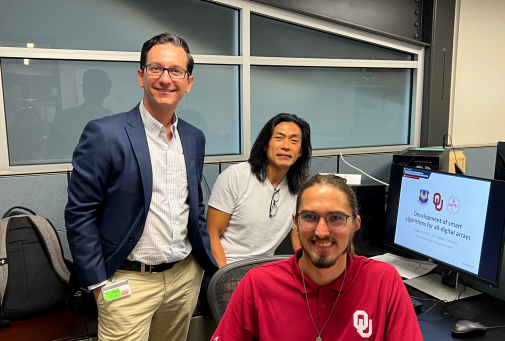Researchers from the Advanced Radar Research Center at the University of Oklahoma are working with personnel from the Oklahoma City Air Logistics Complex to develop a simulation framework to explore applications of an innovative all-digital radar using machine learning algorithms.
The project, “Development of Smart Algorithms for All-Digital Arrays," is one of six engineering projects coordinated by OU’s Oklahoma Aerospace and Defense Innovation Institute in collaboration with the OC-ALC, headquartered at Tinker Air Force Base in Midwest City. The research is being led at OU by Tian-You Yu, Ph.D., a professor in the Gallogly College of Engineering’s School of Electrical and Computer Engineering and the director of operations at the Advanced Radar Research Center. OU’s ARRC is the largest academic radar program in the nation.
“Digital radars provide a high degree of flexibility to implement artificial intelligence algorithms,” said Yu. “In collaboration with our partners at OC-ALC, we are developing a flexible and customizable closed-loop simulation framework to develop and test AI/ML algorithms that can be applied for aircraft surveillance and tracking.”
In addition to Yu, OU researchers contributing to the project include ECE professor Nathan Goodman, Ph.D. and ARRC research scientist David Schvartzman, Ph.D., as well as a graduate and undergraduate research student. Alexander Stringer is the OC-ALC technical lead.
“The simulation framework and developed algorithms will be a flexible testbed for all-digital radar and can be customized to various system architectures and specifications for comparison and training,” Yu said. “This will provide OC-ALC valuable tools to train existing all-digital systems and future capabilities and platforms.”
The two-year project, funded by a $504,419 grant from the OC-ALC, began Sept. 1, 2021, and is expected to be completed by Aug. 31, 2023.


